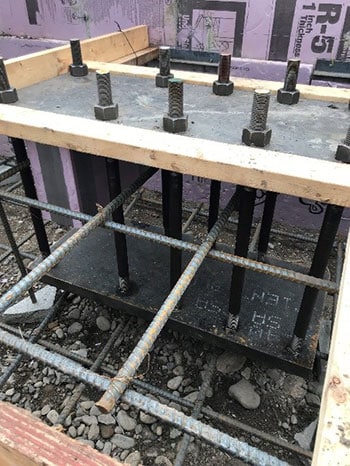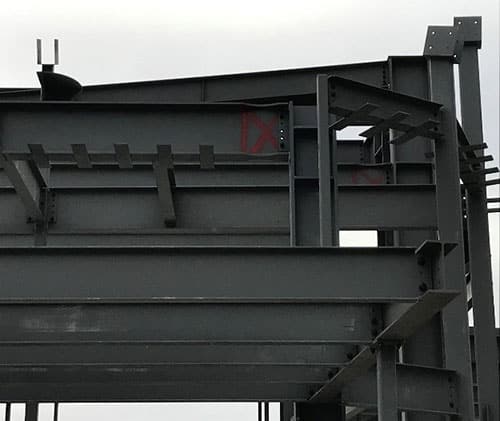

Structural Quality Control: What’s Required During Construction?
By Nate Menuez, PE
Moving a project into construction can be daunting for the entire design team. Construction can start fast with many details to consider and little time to do it. Often, one important detail gets overlooked by the design team as a project moves into construction. But with the correct Structural Quality Control in place – and an understanding of what’s required during construction – design teams can avoid headaches as the building progresses.
Three Categories of Structural Quality Control
Structural Quality Control can be broken down into the following three categories:
- Inspection by the local building official
- Structural observations
- Structural special inspections
These three terms are commonly used interchangeably but do not mean the same thing. All three are very important to the success of the project and non-redundant.
Let’s define each category:
- Inspection by the Local Building Official will be provided at various intervals during the project. These inspections are general in nature and are usually related to the foundations, floors, slabs, framing, and other non-structural components. The building official’s inspections enforce the local building code and verify the overall compliance of the completed work. They are not detailed inspections.
- Structural Observations performed by the Registered Design Professional (RDP) or appointed; qualified designee involves general review at appropriate intervals during construction. The objective is to periodically monitor the quality of the contractor’s work and determine if the work is proceeding in accordance with the contract documents. Structural observation does not involve detailed inspections or continuous project reviews. Structural Observations are an International Buildings Code (IBC) code-mandated requirement, although the IBC does allow exceptions when Structural Observations can be excluded. Note, Structural Observations do not include or waive the responsibility for Structural Special Inspections required by the IBC.
- Structural Special Inspections are an IBC code-mandated review of the project’s specific structural connections, elements, and systems. The Structural Special Inspector can be any qualified person with the knowledge, expertise, or required certification to ensure the constructed items conform with the construction documents. The project’s RDP will indicate which structural special inspections are required, using the IBC as a guideline, with a Statement of Special Inspections (the Statement of Special Inspections can be provided on the construction documents or as a separate document).
So what Structural Quality Control aspects are actually required for your next project?” Here are some guidelines that will help you understand the differences.


Inspections From the Local Building Official
Typically, inspections from the Local Building Official are provided as a courtesy by the local building jurisdiction (this cost is assumed to be wrapped into the permit fees or similar fees in this process). These inspections are generally coordinated between the general contractor and the local building official. Hence, typically there is not any effort, coordination, or cost required by the design team or owner.
Structural Observation
Requirements for Structural Observations are vaguely defined in the IBC. The IBC does list several specific conditions where Structural Observations are required. At the same time, the RDP and/or Local Building Authority can also list their own specific conditions for Structural Observations. This can lead to significant confusion on what effort is actually required for Structural Observations. The best practice is to clearly define this effort (with input from the RDP and Local Building Authority) during the design phase. The cost for this effort is then typically covered by the owner as a part of the RDP construction services.
Structural Special Inspections
Required Structural Special Inspections are clearly defined by the IBC. Typically, materials testing is also included in Structural Special Inspections efforts. As indicated above, Structural Special Inspections can be performed by the RDP or an independent third party. As the scale and complexity of a project increase, the effort required for Structural Special Inspections and Materials Testing will increase. The RDP should clearly indicate, per IBC, all elements requiring Structural Special Inspection and materials testing. This is an extremely important effort to define as early in the design phase as possible and get included in the overall project budget. Since the owner carries the dollar amount for this effort and can sometimes extend to 0.5% to 1.0% of construction, it is crucial to plan for this cost well in advance.
Make Plans Early
In summary, it is best to determine what is required for Structural Quality Control as early in the design process as possible. The structural RDP should be heavily involved in coordinating with the design team, local authority, and owner. Before the final construction document deliverable, the structural RDP should have defined a clear path forward for the project’s code-required Structural Quality Control efforts. Often, if the Structural Quality Control efforts and requirements are not discussed and determined by the design team until construction commences, project delays, unanticipated costs, and unhappy owners can be unfavorable results.


